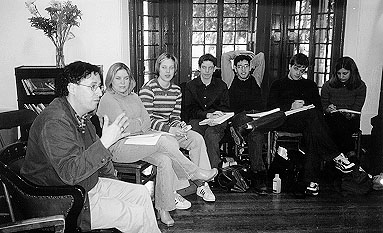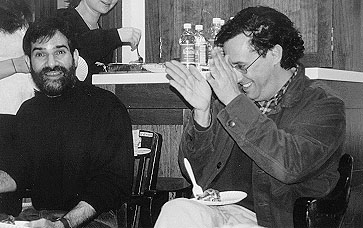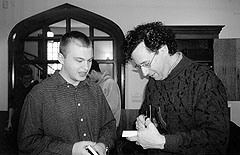Tony Kushner
February 12–13, 2001
February 13 Discussion
Listen to the whole discussion, moderated by Al Filreis MP3
- introduction MP3
- on Herman Melville MP3
- homosexuality MP3
- published text and its relation to performance MP3
- the difficulty of writing MP3
- critics MP3
- Kushner reads from an article on love and sex from Esquire magazine MP3
- sex MP3
- sources of inspiration MP3
- best book to read to a lover MP3
- whether the creation of self is a privelege MP3
- Kushner reads from Walt Whitman's An American Primer MP3
Bio
 Tony Kushner's seven-hour, two-part Broadway production of Angels in
America: A Gay Fantasia on National Themes is a masterful epic. It has
received a Pulitzer Prize, two Tony Awards, two Drama Desk Awards, the
Evening Standard Award, two Olivier Award nominations, the New York
Critics Circle Award, the Los Angeles Drama Critics Circle Award, and the
LAMBDA Literary Award for Drama. Kushner's other plays include
Hydiotaphia, A Bright Room Called Day, Slavs!, and
adaptations of Geothe's
Stella, Brecht's The Good Person of Setzuan, Ansky's The
Dybbuk, and Corneille's The Illusion. In addition, Kushner has received grants
from the New York State Council on the Arts, the NEA, the Whiting Foundation,
and the American Academy of Arts and Letters. Tony Kushner and Bobby McFerrin have
collaborated on an opera, Caroline, or Change, which has been
produced at the San Francisco Opera. He has been working on a new play, Henry Fox
Brown or the Mirror of Slavery, as well as on a new play with music,
St. Cecilia. Kushner intends his plays to be part of a greater political
movement; his work is concerned with moral responsibility during
politically repressive times. One play - set in 1986 at the height of the
AIDs epidemic, the demise of communism, and the unraveling of Reaganism -
opens daringly with a blind Russian man, the world's oldest living
Bolshevik, posing the questions: "Are we doomed? Will the past release us?
Can we change?" Kushner has a way of bringing the lofty into the sphere of
the approachable by creaeting everyday characters that collide both
comically and tragically on stage. The gay, Jewish socialist raised in
Louisiana and educated at Columbia and NYU most enjoys addressing
audiences that are receptive to ideas for change and progress. One critic
has written of Angels in America: "The entire work is the broadest,
deepest, most searching American play of our time."
Tony Kushner's seven-hour, two-part Broadway production of Angels in
America: A Gay Fantasia on National Themes is a masterful epic. It has
received a Pulitzer Prize, two Tony Awards, two Drama Desk Awards, the
Evening Standard Award, two Olivier Award nominations, the New York
Critics Circle Award, the Los Angeles Drama Critics Circle Award, and the
LAMBDA Literary Award for Drama. Kushner's other plays include
Hydiotaphia, A Bright Room Called Day, Slavs!, and
adaptations of Geothe's
Stella, Brecht's The Good Person of Setzuan, Ansky's The
Dybbuk, and Corneille's The Illusion. In addition, Kushner has received grants
from the New York State Council on the Arts, the NEA, the Whiting Foundation,
and the American Academy of Arts and Letters. Tony Kushner and Bobby McFerrin have
collaborated on an opera, Caroline, or Change, which has been
produced at the San Francisco Opera. He has been working on a new play, Henry Fox
Brown or the Mirror of Slavery, as well as on a new play with music,
St. Cecilia. Kushner intends his plays to be part of a greater political
movement; his work is concerned with moral responsibility during
politically repressive times. One play - set in 1986 at the height of the
AIDs epidemic, the demise of communism, and the unraveling of Reaganism -
opens daringly with a blind Russian man, the world's oldest living
Bolshevik, posing the questions: "Are we doomed? Will the past release us?
Can we change?" Kushner has a way of bringing the lofty into the sphere of
the approachable by creaeting everyday characters that collide both
comically and tragically on stage. The gay, Jewish socialist raised in
Louisiana and educated at Columbia and NYU most enjoys addressing
audiences that are receptive to ideas for change and progress. One critic
has written of Angels in America: "The entire work is the broadest,
deepest, most searching American play of our time."






